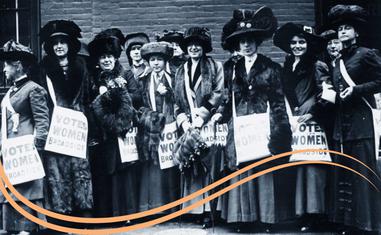The views expressed in our content reflect individual perspectives and do not represent the authoritative views of the Baha'i Faith.
In a speech he gave in Paris in 1913, Abdu’l-Baha explained the newness and uniqueness of the Baha’i teachings by focusing on a single foundational Baha’i principle: the absolute equality of the sexes.
RELATED: The Happiness of Mankind Depends on Equality for Women
In that speech and in others he gave during the same period, Abdu’l-Baha – the son and successor of Baha’u’llah, the prophet and founder of the Baha’i Faith – set out a challenge to all humanity. He asked us all to recognize and act to bring about gender equality around the world:
God has created all creatures in couples. Man, beast, or vegetable, all the things of these three kingdoms are of two sexes, and there is absolute equality between them.
In the vegetable world there are male plants and female plants; they have equal rights, and possess an equal share of the beauty of their species; though indeed the tree that bears fruit might be said to be superior to that which is unfruitful.
In the animal kingdom we see that the male and the female have equal rights; and that they each share the advantages of their kind.
Now in the two lower kingdoms of nature we have seen that there is no question of the superiority of one sex over the other. In the world of humanity we find a great difference; the female sex is treated as though inferior, and is not allowed equal rights and privileges. This condition is due not to nature, but to education. In the Divine Creation there is no such distinction. Neither sex is superior to the other in the sight of God. Why then should one sex assert the inferiority of the other, withholding just rights and privileges as though God had given His authority for such a course of action? …
Divine Justice demands that the rights of both sexes should be equally respected since neither is superior to the other in the eyes of Heaven. Dignity before God depends, not on sex, but on purity and luminosity of heart. Human virtues belong equally to all!
At the time Abdu’l-Baha gave this speech, in 1913, the women’s suffrage movement had not yet achieved widespread success, and women still could not vote in the United States and most other countries. In fact, only a handful of the world’s nations had granted women universal suffrage by then; almost all European, Asian and African countries still disenfranchised women.
Later during that same year, the British suffragette firebrand Emmeline Pankhurst gave her landmark women’s rights speech “Freedom or Death” in Hartford, Connecticut. But prior to both of their important addresses, Abdu’l-Baha and Pankhurst met in London, and had this exchange, as reported in Earl Redman’s book Abdu’l-Baha in their Midst:
Abdu’l-Baha … met with many visitors, including a militant suffragist. A number of suffragettes came to see him during His two visits to England. One, the famous Emmeline Pankhurst, called Abdu’l-Baha a ‘prophet’, whereupon He said, ‘Oh no! I am a man, like you’. Apparently Mrs Pankhurst was ‘much cheered by her interview, for the Master told her to continue her work steadfastly, for women would very shortly take their rightful place in the world’. He advised the militant who visited him on 19 December that women who were campaigning for the right to vote should refrain from any acts of violence in their efforts, but should ‘use the power of intelligence, with scientific accomplishments, with artistic attainments. Unseemly deeds would rather retard the realization of their cherished hope. In this age a weak person resorts to frightful measures, but an intelligent person used the superior power of intelligence and wisdom.’
So the Baha’i teachings on the equality of men and women, which precede much of the progress women have made since the early 20th century, call for not only universal suffrage and equal treatment, but the absolute equality of women.
Emmeline Pankhurst fought valiantly for the rights of women. She went to prison, was tortured with forced feeding during hunger strikes, and was repeatedly beaten by men who opposed gender equality and attacked her while she participated in marches and demonstrations. But today, every year on July 14th, Great Britain celebrates Emmeline Pankhurst Day. Five years after she and Abdu’l-Baha made their 1913 speeches, England gave (some) women the right to vote – those over the age of 30 who owned property. A decade later, on July 2, 1928, the United Kingdom enfranchised all women over the age of 21. Emmeline Pankhurst had died on June 14th, just a few weeks before her dream of women’s suffrage came true in her country.
RELATED: In Pursuit of Equality: 100 Years of Women’s Suffrage
Not until thirty-five years after Abdu’l-Baha’s speech in Paris, in 1948, did the newly-formed United Nations codify the rights of women to vote into international law. The U.N.’s Human Rights Commission elected as its chairperson Eleanor Roosevelt, and she helped drive the adoption of the Universal Declaration of Human Rights – which made universal suffrage the standard of the world’s most progressive and freedom-loving governments.
This radical new religious requirement of the equality of the sexes, Abdu’l-Baha said in a talk he gave in New York City in 1912, happened when Baha’u’llah established:
… the equality of man and woman. This is peculiar to the teachings of Baha’u’llah, for all other religions have placed man above woman.
Far from being a simple proclamation of theoretical equality, Abdu’l-Baha also identified very specific standards the world must adopt to bring about the equality of women and men, which include universal suffrage and equal education, but also encompass equality in the workplace, in the home, and in the social and political sphere.

















Comments
Sign in or create an account
Continue with Facebookor